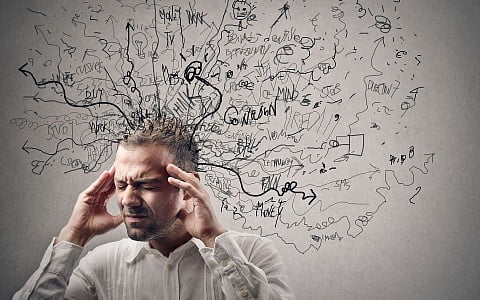
Sniff lavender, wash the dishes and listen, how the waterfall makes noise.
Psychologists say, that negative emotions cannot be constantly suppressed. Anger, insult, sadness is an important feeling, who deserve to be expressed. But sometimes my nerves fail at the wrong time.. In this case, the advice of scientists will help you quickly calm down..
1. Breathe deeply
This is an old thing.. But scientists did not understand for a long time, why deep breathing works. Лишь в 2017-м в журнале Science было опубликовано studyThe Effect of Diaphragmatic Breathing on Attention, Negative Affect and Stress in Healthy Adults, which dotted all the i.
Its authors, biochemists at Stanford University School of Medicine, discoveredStudy shows how slow breathing induces tranquility глубоко в стволе мозга крошечный кластер нейронов, which the, as supposed, connects the speed and depth of breathing and emotional state. The more active and shallow the breaths, the higher the level of arousal and nervousness. И напротив — чем глубже мы дышим, the more relaxed and calm we feel.
Truth, experiments, proving the link between breathing and relaxation, so far have been carried out only on mice. But researchers are fairly confident in extrapolating their results to humans..
2. Use blue light
Blue light helps people relax faster after psychosocial stress. This discoveredBlue lighting accelerates post-stress relaxation: Results of a preliminary study учёные из Гранадского университета.
Psychosocial stress, as formulated by the researchers themselves, Is a short-term nervous shock, that occurs during contact with other people. Simple examples: you argued with a friend, had a fight with a colleague, nervous about, that the boss is sitting on his head and yelling about the deadline, which was yesterday ...
Любознательные учёные устраивали подобные переживания 12 добровольцам в возрасте от 18 to 37 years, and then they took the subjects to the so-called chromotherapy room. There was nothing in her, what could help calm down, - only LEDs, emitting then standard white, then blue light.
It revealed, что под синим светом мозговая и сердечная активность людей возвращались в норму в среднем за 1,1 minutes, and under white - for 3,5. That is three times faster!
By the way, besides lamps, blue light emit screens of modern gadgets - computers, Notebooks, smartphones. Stress is the case, when even scientists recommend: minutes 10 повтыкайте в любимый девайс. It will help you relax..
3. Play the most soothing song in the world
Weightless была записана ещё в 2011 year. This happened by order of the scientists of the British Academy of Sound Therapy., who decided to experiment and create a song, способную максимально быстро успокоить и даже усыпить.
Композиция длиной чуть больше 8 минут насыщена различными звуковыми эффектами. The trick is in the rhythm: the body adjusts to it, heart beats less often, breathing slows down ...
The effect of the song was so amazing, что журнал Time даже включил Weightless в список 50 самых значительных изобретений года.
Чтобы успокаивающее влияние Weightless было более мощным, take care of the entourage: put on your headphones, get into a comfortable position, relax, close your eyes.
4. Hear the sounds of nature
StudyIT’S TRUE – THE SOUND OF NATURE HELPS US RELA, проведённое в 2017 году учёными из Медицинской школы Брайтона и Сассекса, proved: when people listen to the sounds of nature, their stress levels are markedly reduced.
The researchers exposed volunteers to natural and artificial (technogenic, social) noise. In parallel, MRI scans of the participants' brains and monitoring of the heart rate were performed. As it turned out, brain activity is highly dependent on the nature of sounds.
With a natural scale, the focus of our attention is directed outward.: we are listening, peering into the world around us, falling into a kind of soothing trance. Artificial soundtrack shifts the focus of attention inward: we begin to actively delve into ourselves, worry, exaggerate one's own shortcomings, which ultimately exacerbates stress.
Perfect, if there is a walking park near you, where you can hear birds singing and the rustle of foliage. Or a running stream, on the banks of which you can sit. If there is nothing suitable, используйте записи с этих сайтов и приложений.
5. Smell something nice
Although aromatherapy in general looks pretty dubious from a scientific point of view, the effect of some essential oils on stress levels has been proven unequivocally and repeatedly.
Smells of lavender, rosemaryThe effects of lavender and rosemary essential oils on test-taking anxiety among graduate nursing students, а также иланг-иланга снижают кровяное давление и частоту сердечных сокращений, reduce the level of anxiety and excitement.
Carry a small bottle of one of the following oils with you, the scent of which you find the most pleasant, и в стрессовые моменты вытряхивайте 1–2 капли на запястье. A couple of breaths - and it will be much easier to calm down.
6. Do something as focused as possible.
Do the washing up. Underline the pole. Lay out the papers. Clean your desktop on your computer or smartphone. The main thing is to try to concentrate on this activity..
StudyChore or stress reliever: Study suggests that washing dishes decreases stress, проведённое в 2015 году в Университете Флориды, proved: focused activity is a very effective way to quickly reduce stress.
This is because, what, fully concentrating on something, we are distracted from negative experiences. The brain "switches" and reduces the production of stress hormones.
7. Distance yourself from yourself
Try to look at the situation from the outside, as if all this is not happening to you. Imagine, that the problems are not yours, and someone else. Reception elementary, but surprisingly effective: психологи fixBeneficial effects of training in self-distancing and perspective broadening for people with a history of recurrent depression резкое снижение уровня тревожности и стресса и даже рекомендуют подобный подход в борьбе с затяжными депрессиями.


